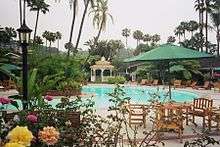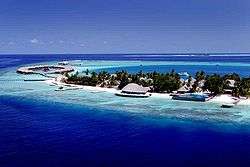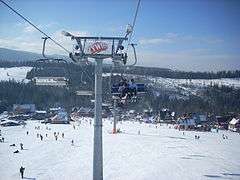Resort

In North American English, the term "resort" is used for a self-contained commercial establishment which attempts to provide for most of a vacationer's wants while remaining on the premises, such as food, drink, lodging, sports, entertainment, and shopping. The term may be used to identify a hotel property that provides an array of amenities and typically includes entertainment and recreational activities. A hotel is frequently a central feature of a resort, such as the Grand Hotel at Mackinac Island, Michigan. Some resorts are also timeshare or fractionally owned, or wholly owned condominium complexes. A resort is not always a commercial establishment operated by a single company, although in the late twentieth century this sort of facility became more common.
Resort towns
Towns which are resorts — or where tourism or vacationing is a major part of the local activity — are sometimes called resort towns. If they are by the sea they are called seaside resorts. Inland resorts include ski resorts, mountain resorts and spa towns. Towns such as Bandipur in Nepal, Sochi in Russia, Sharm el Sheikh in Egypt, Barizo in Spain, Cortina d'Ampezzo in Italy, Druskininkai in Lithuania, Cancún in Mexico, Newport, Rhode Island and Key West, Florida in the USA, Ischgl in Austria, St. Moritz in Switzerland, Blackpool in England and Malam Jabba in Pakistan are well-known resorts.
Island resorts

A resort island is an island or an archipelago that contains resorts, hotels, restaurants, tourist attractions and its amenities. Maldives has topped as having the best island resorts and they have become famous among the top celebrities and sportspersons around the world.
Seaside resorts

Seaside resorts are located on a coast. In the United Kingdom, many seaside towns have turned to other entertainment industries, and some of them have a good deal of nightlife. The cinemas and theatres often remain to become host to a number of pubs, bars, restaurants and nightclubs. Most of their entertainment facilities cater to local people and the beaches still remain popular during the summer months.
Ski resorts
In Europe and North America, ski resorts are towns and villages in ski areas, with support services for skiing such as hotels and chalets, equipment rental, ski schools and ski lifts to access the slopes.
Other resort towns
Resorts which serve different purposes also exist. One such example is Yulara, Northern Territory which exists to serve Uluru (Ayres Rock) and Kata Tjuta (The Olgas), in Australia
Self-contained resorts
Destination resort
A destination resort is a resort that contains, in and of itself, the necessary guest attraction capabilities—that is to say that a destination resort does not need to be near a destination (town, historic site, theme park, or other) to attract its public. A commercial establishment at a resort destination such as a recreational area, a scenic or historic site, a theme park, a gaming facility or other tourist attraction may compete with other businesses at a destination. Consequently, another quality of a destination resort is that it offers food, drink, lodging, sports and entertainment, and shopping within the facility so that guests have no need to leave the facility throughout their stay. Commonly these facilities are of higher quality than would be expected if one were to stay at a hotel or eat in a town's restaurants. Some examples are Atlantis in the Bahamas, the Walt Disney World Resort near Orlando, Florida, USA, Costa do Sauípe in Northeastern Brazil, Laguna Phuket in Thailand and Sun City near Johannesburg in South Africa. Closely related to these resorts are convention and large meeting sites. Generally these occur in cities where special meeting halls, together with ample accommodations as well as varied dining and entertainment, are provided.
All-inclusive resort
An all-inclusive resort charges a fixed price that includes most or all items. At a minimum, most inclusive resorts include lodging, unlimited food, drink, sports activities, and entertainment for the fixed price. In recent years, the number of resorts in the United States offering "all-inclusive" amenities has decreased dramatically; in 1961, over half offered such plans and in 2007, less than ten percent do so.[1]
All-inclusive resorts are found in the Caribbean, Egypt, particularly in Dominican Republic, and elsewhere. Notable examples are Club Med, Sandals Resorts and Beaches Resorts
An all-inclusive resort includes a minimum of three meals daily, soft drinks, most alcoholic drinks, gratuities and possibly other services in the price. Many also offer sports and other activities included in the price as well. They are often located in warmer regions. The all-inclusive model originated in the Club Med resorts which were founded by the Belgian Gérard Blitz.[2]
Some all-inclusive resorts are designed for specific vacation interests. For example, certain resorts cater to adults, while even more specialized properties accept couples only. Other all-inclusive resorts are geared toward families, with facilities like craft centers, game rooms and water parks to keep children of all ages entertained. All inclusive resorts are also very popular locations for destination weddings.
Recreation
A spa resort is a short term residential/lodging facility with the primary purpose of providing individual services for spa-goers to develop healthy habits. Historically many such spas were developed at the location of natural hot springs or sources of mineral waters. Typically over a seven-day stay, such facilities provide a comprehensive program that includes spa services, physical fitness activities, wellness education, healthy cuisine and special interest programming.
Golf resorts are resorts that cater specifically to the sport of golf, and include access to one or more golf course and or clubhouse. Golf resorts typically provide golf packages that provide visitors with all greens and cart fees, range balls, accommodations and meals.

In North America a ski resort is generally a destination resort in a ski area, and is less likely to refer to a town or village.
A resort can be an expensive vacations and often boasts many visitor activities and attractions such as golf, watersports, spa and beauty facilities, skiing, natural ecology and tranquility. Because of the extent of amenities offered, a it may be considered destination resort.

A megaresort is a type of destination resort which is of an exceptionally large size, such as those along the Las Vegas Strip. In Singapore an integrated resort is a euphemism for a casino-based destination resort.
A holiday village is a type of self-contained resort in Europe, where the accommodation is generally in villas. A holiday camp in the United Kingdom refers to a resort where the accommodation is in chalets. The term "holiday park" is used for a resort where the accommodation includes static caravans and chalets.
Timeshare
There are 1500+ timeshare resorts in the U.S. that are operated by major hospitality, timeshare-specific, or independent companies. These represent 198,000 residences and nearly 9 million owners, who pay an average $880 per year in maintenance fees. A reported 16% of these residences became vacation rentals.[3]
Notable historic resorts
- A famous historic resort of the ancient world was Baiae, an Italian resort that was popular over 2,000 years ago. Capri, an island near Naples, Italy, has attracted visitors since Roman times.
- Another famous historic resort was Monte Ne near Rogers, Arkansas, United States, which was active in the early 20th century. At its peak more than 10,000 people a year visited its hotels, and two of its hotels, "Missouri Row" and "Oklahoma Row", were the largest log buildings in the world. Monte Ne closed in the 1930s, and was ultimately submerged under Beaver Lake in the 1960s.
- Tawawa House, also known as Tawawa Springs or Xenia Springs, inspired Dolen Perkins-Valdez to write her debut novel Wench (2010)[4] when she read about it in an autobiography of W.E.B. Dubois. The book mentioned in passing that the land for Wilberforce University had once been used for a privately owned resort called Tawawa House, where white slave owners would bring the black slaves they kept as mistresses.[5][6]
See also
- Canada's grand railway hotels
- Condo hotel
- Destination Club
- Resort architecture
- Sanatorium (health resort)
- Spa (disambiguation)
- Vacation rentals
- Timeshare
References
| Wikimedia Commons has media related to Resorts. |
| Look up resort in Wiktionary, the free dictionary. |
- ↑ "American Plan resorts among last of vanishing breed". Associated Press. CNN.com. June 28, 2007. Archived from the original on 2007-10-12. Retrieved 2007-06-29.
- ↑ Garrett Nagle (1999). Tourism, Leisure and Recreation. Nelson Thornes. ISBN 0-17-444705-1.
- ↑ "2015 State of the Industry". Developments. Retrieved July 1, 2015.
- ↑ Perkins-Vadez, Dolen (2010). Wench. Amistad. ASIN B004NE8RZ4.
- ↑ O'Neal Parker, Lonnae. "A tender spot in master-slave relations". Washington Post. Retrieved 15 April 2015.
- ↑ "Old Wilberforce University Campus at Tawawa Springs". The Historical Marker Database. Retrieved May 28, 2015.

